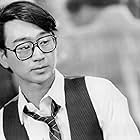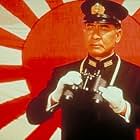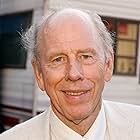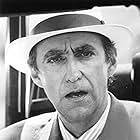When a Japanese automobile company buys an American plant, the American liaison must mediate the clash of work attitudes between the foreign management and native labor.When a Japanese automobile company buys an American plant, the American liaison must mediate the clash of work attitudes between the foreign management and native labor.When a Japanese automobile company buys an American plant, the American liaison must mediate the clash of work attitudes between the foreign management and native labor.
- Awards
- 1 win
Sô Yamamura
- Mr. Sakamoto
- (as Soh Yamamura)
Patti Yasutake
- Umeki Kazihiro
- (as Patti Yasuiake)
Storyline
Did you know
- TriviaAccording to Bloomberg Businessweek, Toyota executives later used the movie as an example of how not to manage Americans.
- GoofsWhen Hunt Stevenson meets the Japanese managers for the first time, they hand their business cards over with one hand. Japanese business protocol requires formally presenting business cards, holding them with both hands.
- Quotes
Hunt Stevenson: Afterwards, we have a few beers and piss for distance.
Oishi Kazihiro: For us, it's accuracy.
- Alternate versionsSome international editions distributed by Paramount on DVD, reduced the aspect ratio from original 2.39:1 to 2.09:1.
- ConnectionsFeatured in Generation X: The Power of Disruption (2016)
- SoundtracksDon't Get Me Wrong
Written by Chrissie Hynde
Performed by The Pretenders
Produced by Jimmy Lavine and Bob Clearmountain
Courtesy of Sire Records Company
Featured review
Some of the IMDb reviewers to date have noted aspects of bigotry and prejudice in this film. As one commented, the "Gung Ho" of 1986 would never be made today - in 2020. To no longer have cultural prejudices is a worthy goal. But, that we might no longer have freedom of speech and the liberties associated with that is scary.
Not having seen this film until recently, I saw another aspect of it - satire. But it seems not to have been so obvious to others. I can't find anything on the Web that says director Ron Howard intended "Gung Ho" as a satire. So, one doesn't know if he planned it that way or not. What one is left with is a typical comedy of the late 20th century. It lampoons people, places and things in the name of comedy.
So, what to make of "Gung Ho" as a comedy -- or satire? It's crude, it highly exaggerates, and it portrays bigotry. But, portraying bigotry is not the same as being bigoted. Especially where the film lampoons aspects of both Japanese and Americans, their respective cultures of the time, and their work ethics.
And, with that, the film clearly throws political correctness to the wind. For the most part, lampooning PC is good and healthy because it had been carried to such extremes by the end of the last century. The specter of a "thought police" loomed in the future. So, PC itself often clashes with aspects of freedom and liberty, as well as common sense.
Of course, the idea of devotion to the company above all else makes industry a god. And the film clearly shows how the humanity of mankind suffers then, in the families and social structure. I like the undertone of this plot that compares individualism with team work. It points out the strengths of both, and their shortcomings. Its conclusion is very appropriate for a healthy - and happy, society.
If one can see the offsetting poking of fun at the Americans and Japanese in this film, a little lesson emerges about the need for society to get along, and to accept and appreciate our many differences. There's a little of the ugly American in here in George Wendt's meanness with the Japanese manager's wife in the super market. But there's also a depiction of American failure. Again, Wendt's character, Buster, is the source when he argues with a Japanese supervisor on the auto assembly line about allowing occasional flaws to go through. That, indeed, was a striking difference that was at the heart of the Japanese recovery from World War II.
I don't know if anyone connected with this film in 1986 was familiar with that history and how the Japanese industrial supremacy came about. It started in 1950 with a Wyoming-raised American statistician and engineer by the name of W. Edwards Deming. I was fortunate to have attended a talk by Deming in the early 1970s in Washington, D.C., when he related his work with the Japanese to help their industries and economy recover after the war. For his mostly non-scientific members of the audience, Deming kept it very simple. I can never forget his ball bearings example. It was based on his actual statistical studies.
It went something like this. For every 1,000 steel ball bearings that American car makers had been using for wheels, three would be defective. They might be flattened and not perfectly rounded from a flaw at the ball bearing plant. Most wheel bearings will last 100,000 miles or more. But those cars that got wheels with faulty bearings would have wheel problems after just a few thousand miles. Deming used this example with Japanese companies to convince them to single source their suppliers and use zero defects checking up front. By applying this and other principles he used, the Japanese auto industry soon eliminated early car operating problems in all areas.
The result was automobiles that were far more efficient, trouble-free and well made than American cars that had held market sway for decades. Since the early 1980s, Japanese autos have set the standards for quality and workmanship. American and European car makers have been playing catch-up ever since.
So, there's considerably more to this film than a slangy, mocking comedy. One suspects that the director and writers knew and intended that all along. But, packaging it the way they did, it would have some appeal as raw and crude comedy that was something of a fad among many - but not all, movie buffs of that time.
As the reviewers to date indicate - indeed, as with many movies, some viewers may like "Gung Ho" while others may think it's quite bad. Those who haven't yet watched it and may be considering it, should take these things into account.
The last thing that should be mentioned as worthy of note is the acting. There's nothing above average by the American actors -- except for Michael Keaton. He nails the character of Hunt Stevenson, whether one likes him or not. And, Gedde Watanabe is superb as the perplexed, conflicted plant manager, Oishi Kazihiro. Most in the Japanese cast are very good.
Had this movie been made more clearly as a satire, it could have been very enjoyable and entertaining. By thus quashing its otherwise bigoted tone, it could have earned a couple more stars than the six I give it.
Here are some favorite lines. . Hunt Stevenson, "You know, the amazing thing is, I'm not even nervous." Audrey, "Babe?" Stevenson, "Yeah?" Audrey, "You just put your garbage in my car."
Oishi Kazihiro, "You're right! You're right!" Hunt Stevenson, "I am? Are you shittin' me?" Kazihiro, "No. You are in much more trouble than me. Ah ha, ha, ha. I feel much better."
Oishi Kazihiro, after Hunt follows him into the river, "I'm not drowning myself. I'm just freaking out."
Not having seen this film until recently, I saw another aspect of it - satire. But it seems not to have been so obvious to others. I can't find anything on the Web that says director Ron Howard intended "Gung Ho" as a satire. So, one doesn't know if he planned it that way or not. What one is left with is a typical comedy of the late 20th century. It lampoons people, places and things in the name of comedy.
So, what to make of "Gung Ho" as a comedy -- or satire? It's crude, it highly exaggerates, and it portrays bigotry. But, portraying bigotry is not the same as being bigoted. Especially where the film lampoons aspects of both Japanese and Americans, their respective cultures of the time, and their work ethics.
And, with that, the film clearly throws political correctness to the wind. For the most part, lampooning PC is good and healthy because it had been carried to such extremes by the end of the last century. The specter of a "thought police" loomed in the future. So, PC itself often clashes with aspects of freedom and liberty, as well as common sense.
Of course, the idea of devotion to the company above all else makes industry a god. And the film clearly shows how the humanity of mankind suffers then, in the families and social structure. I like the undertone of this plot that compares individualism with team work. It points out the strengths of both, and their shortcomings. Its conclusion is very appropriate for a healthy - and happy, society.
If one can see the offsetting poking of fun at the Americans and Japanese in this film, a little lesson emerges about the need for society to get along, and to accept and appreciate our many differences. There's a little of the ugly American in here in George Wendt's meanness with the Japanese manager's wife in the super market. But there's also a depiction of American failure. Again, Wendt's character, Buster, is the source when he argues with a Japanese supervisor on the auto assembly line about allowing occasional flaws to go through. That, indeed, was a striking difference that was at the heart of the Japanese recovery from World War II.
I don't know if anyone connected with this film in 1986 was familiar with that history and how the Japanese industrial supremacy came about. It started in 1950 with a Wyoming-raised American statistician and engineer by the name of W. Edwards Deming. I was fortunate to have attended a talk by Deming in the early 1970s in Washington, D.C., when he related his work with the Japanese to help their industries and economy recover after the war. For his mostly non-scientific members of the audience, Deming kept it very simple. I can never forget his ball bearings example. It was based on his actual statistical studies.
It went something like this. For every 1,000 steel ball bearings that American car makers had been using for wheels, three would be defective. They might be flattened and not perfectly rounded from a flaw at the ball bearing plant. Most wheel bearings will last 100,000 miles or more. But those cars that got wheels with faulty bearings would have wheel problems after just a few thousand miles. Deming used this example with Japanese companies to convince them to single source their suppliers and use zero defects checking up front. By applying this and other principles he used, the Japanese auto industry soon eliminated early car operating problems in all areas.
The result was automobiles that were far more efficient, trouble-free and well made than American cars that had held market sway for decades. Since the early 1980s, Japanese autos have set the standards for quality and workmanship. American and European car makers have been playing catch-up ever since.
So, there's considerably more to this film than a slangy, mocking comedy. One suspects that the director and writers knew and intended that all along. But, packaging it the way they did, it would have some appeal as raw and crude comedy that was something of a fad among many - but not all, movie buffs of that time.
As the reviewers to date indicate - indeed, as with many movies, some viewers may like "Gung Ho" while others may think it's quite bad. Those who haven't yet watched it and may be considering it, should take these things into account.
The last thing that should be mentioned as worthy of note is the acting. There's nothing above average by the American actors -- except for Michael Keaton. He nails the character of Hunt Stevenson, whether one likes him or not. And, Gedde Watanabe is superb as the perplexed, conflicted plant manager, Oishi Kazihiro. Most in the Japanese cast are very good.
Had this movie been made more clearly as a satire, it could have been very enjoyable and entertaining. By thus quashing its otherwise bigoted tone, it could have earned a couple more stars than the six I give it.
Here are some favorite lines. . Hunt Stevenson, "You know, the amazing thing is, I'm not even nervous." Audrey, "Babe?" Stevenson, "Yeah?" Audrey, "You just put your garbage in my car."
Oishi Kazihiro, "You're right! You're right!" Hunt Stevenson, "I am? Are you shittin' me?" Kazihiro, "No. You are in much more trouble than me. Ah ha, ha, ha. I feel much better."
Oishi Kazihiro, after Hunt follows him into the river, "I'm not drowning myself. I'm just freaking out."
- How long is Gung Ho?Powered by Alexa
Details
Box office
- Budget
- $18,000,000 (estimated)
- Gross US & Canada
- $36,611,610
- Opening weekend US & Canada
- $7,170,830
- Mar 16, 1986
- Gross worldwide
- $36,611,610
- Runtime1 hour 51 minutes
- Sound mix
- Aspect ratio
- 2.35 : 1
Contribute to this page
Suggest an edit or add missing content
























